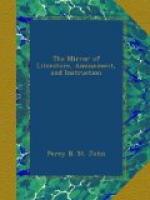Rouletiers
Are fellows who plunder carriages of portmanteaus, imperials, &c.
“One day I followed a famous rouletier named Gosnet. On reaching the Rue Saint Denis, he jumped up on a coach, put on a cloak and cotton cap which he found lying close to his hand, and in this dress got down again with a portmanteau under his arm. It was not later than two o’clock in the afternoon; but to elude all suspicion, Gosnet, on alighting, went straight to the conducteur (guard), and after having spoken to him, turned down a street close at hand. I was in waiting for him, he was apprehended and sentenced.”
Tireurs,
Or pickpockets are as abundant as mushrooms.
“There was in Paris a thief of such incredible dexterity that he robbed without an accomplice. He placed himself in front of a person, put his hand behind him, and took either a watch or some other valuable. This species of thievery is called the vol a la chicane.
“A fellow named Molin, alias Moulin le Chapelier, being under the portico des Francais, was desirous of stealing a gentleman’s purse: the sufferer, who was near the wall, thought he felt some one picking his pocket; Molin, full of presence of mind, effected his object in an instant, the purse was torn from the pocket, he opened it, and taking out a coin, asked for a ticket for the play. At the same moment the person robbed said to him—’But, sir, you have taken my purse, give it to me.’—’The devil I have,’ replied Molin with an air of affected surprise, ‘are you quite sure?’ Then looking attentively at it—’By heavens! I thought it was mine. Oh! sir, I ask your pardon.’
“At the same time he returned the purse, and all the bystanders were persuaded that he had done it involuntarily. This is being fly, or I know nothing about it.
“At the time of the great fog, Molin and a pal named Dorle were stationed at the environs of the Place des Italiens. An old gentleman passed, and Dorle stole his watch which he passed to Molin. The darkness was so great that he could not discern if it were a repeater or not, and to ascertain this, Molin pressed down the spring: the hammer instantly struck on the bell, and by the sound the old man knew his watch, and instantly cried out—’My watch! my watch! pray restore me my watch, it belonged to my grandfather, and is a family piece.’




